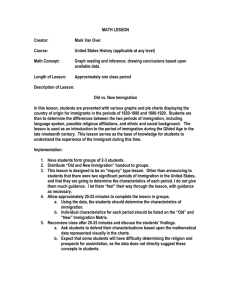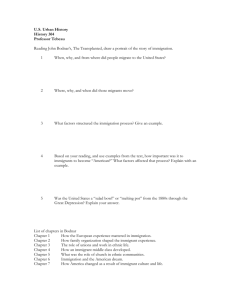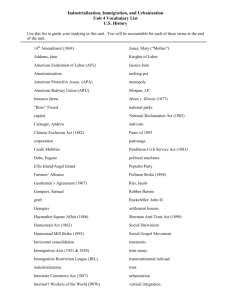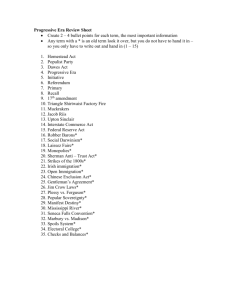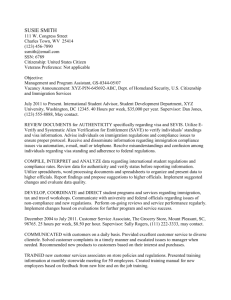End Immigration Arrogance: It's Time to put out a New Welcome Mat
advertisement
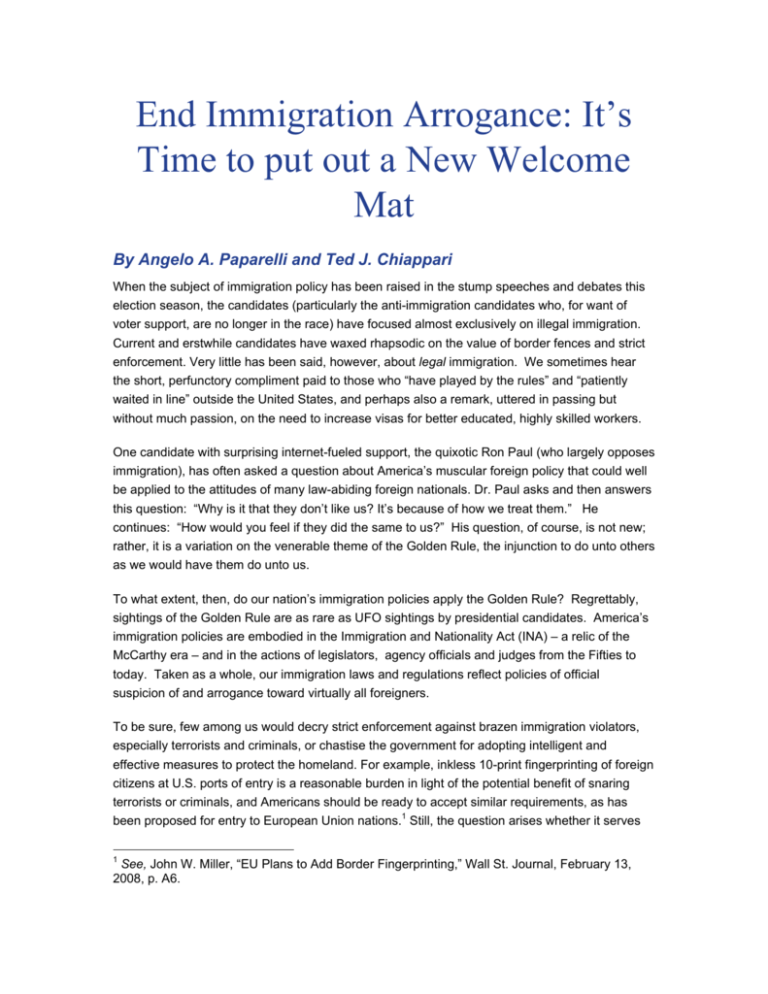
End Immigration Arrogance: It’s Time to put out a New Welcome Mat By Angelo A. Paparelli and Ted J. Chiappari When the subject of immigration policy has been raised in the stump speeches and debates this election season, the candidates (particularly the anti-immigration candidates who, for want of voter support, are no longer in the race) have focused almost exclusively on illegal immigration. Current and erstwhile candidates have waxed rhapsodic on the value of border fences and strict enforcement. Very little has been said, however, about legal immigration. We sometimes hear the short, perfunctory compliment paid to those who “have played by the rules” and “patiently waited in line” outside the United States, and perhaps also a remark, uttered in passing but without much passion, on the need to increase visas for better educated, highly skilled workers. One candidate with surprising internet-fueled support, the quixotic Ron Paul (who largely opposes immigration), has often asked a question about America’s muscular foreign policy that could well be applied to the attitudes of many law-abiding foreign nationals. Dr. Paul asks and then answers this question: “Why is it that they don’t like us? It’s because of how we treat them.” He continues: “How would you feel if they did the same to us?” His question, of course, is not new; rather, it is a variation on the venerable theme of the Golden Rule, the injunction to do unto others as we would have them do unto us. To what extent, then, do our nation’s immigration policies apply the Golden Rule? Regrettably, sightings of the Golden Rule are as rare as UFO sightings by presidential candidates. America’s immigration policies are embodied in the Immigration and Nationality Act (INA) – a relic of the McCarthy era – and in the actions of legislators, agency officials and judges from the Fifties to today. Taken as a whole, our immigration laws and regulations reflect policies of official suspicion of and arrogance toward virtually all foreigners. To be sure, few among us would decry strict enforcement against brazen immigration violators, especially terrorists and criminals, or chastise the government for adopting intelligent and effective measures to protect the homeland. For example, inkless 10-print fingerprinting of foreign citizens at U.S. ports of entry is a reasonable burden in light of the potential benefit of snaring terrorists or criminals, and Americans should be ready to accept similar requirements, as has been proposed for entry to European Union nations.1 Still, the question arises whether it serves 1 See, John W. Miller, “EU Plans to Add Border Fingerprinting,” Wall St. Journal, February 13, 2008, p. A6. our nation’s interest and reflects our bedrock values when, as a matter of law and procedure, we systematically apply the tools of indifference and suspicion to all foreign citizens. If this assertion seems too strong, then consider not just the text of statutes and regulations, the bromides of politicians, and the paeans and poetry of those who hail the Golden Door. Consider the modern-day reality of American immigration law, accurately described by a government spokesperson as “a mystery and a mastery of obfuscation.”2 The first offender of foreign-citizen sensibilities is the U.S. State Department, the agency that staffs U.S. embassies and consulates worldwide with visa officers. Year after year, State has provided a wholly inadequate contingent of consular officials to interview the predictable flow of applicants. As a result, wait times for scheduling of consular interviews vary dramatically among U.S. consular posts, from approximately 30 days in many places to upwards of 60 to 90 days in some of the most understaffed American consulates such as in Brazil and India.3 Hence, a student’s academic future, a relative’s attendance at a family wedding or funeral, a professor’s or novelist’s scheduled speech, and an engineer’s or scientist’s ability to work for a U.S. employer – each can be scuttled if, in the typically two to five minutes of interview time, the applicant fails to carry the statutory burden of proof and persuasion “to the satisfaction of the consular officer” that s/he is eligible for a visa.4 Not surprisingly, some foreign nationals, apparently having lost hope in the fairness of the U.S. system to determine visa eligibility, also pray for divine intervention in their quest to be granted a U.S. visa.5 Visa refusals caused by overly brief interviews or indifferent or errant officers might be tolerable if a meaningful system providing review of consular decisions existed. Rather than allow for administrative or judicial review, however, our immigration laws and case precedents offer little recourse. Lawyers for the applicant are routinely forbidden to participate in the consular interview or even to enter the waiting area. Interviews are not recorded and transcribed. Consular 2 “Immigration law is a mystery and a mastery of obfuscation." U.S. Citizenship and Immigration Services spokeswoman, Karen Kraushaar, quoted in the Washington Post, April 24, 2001 Metro Section, in an article entitled “[Maryland] Family Ensnared in Immigration Maze – After Changes in Law, Couple Faces Deportation.” 3 Information on waiting times at the various embassies and consulates can be found at http://usembassy.state.gov; last accessed on February 13, 2008. 4 Immigration and Nationality Act (INA) §§ 214(b) and 291; 8 U.S.C. §§ 1184(b) and 1361. In Fiscal Year 2007, the Department of State refused 2,098,744 nonimmigrant visas out of 8,542,990 total applications. Of the denied applications, the grounds of refusal were overcome and the visas issued in 467,702 cases. As a result, the “Adjusted Refusal Rate” was 20.2%. See February 7, 2008 Testimony of Stephen A. “Tony” Edson, Deputy Assistant Secretary of State for Visa Service, U.S. Department of State, to the House of Representatives, Committee on Science and Technology, Subcommittee on Research and Science Education, at 10, available at: http://democrats.science.house.gov/Media/File/Commdocs/hearings/2008/Research/08feb07Res earch/Edson_Testimony.pdf or http://tinyurl.com/23e6v3[Editor: use long or short URL as you choose], last accessed on February 13, 2008. 5 See, V. Vara, “Divine Intervention? Indians Seek Help from the ‘Visa God,’” Wall St. Journal, December 31, 2007, p. A1 (“Priest Says Prayers May Aid Those Trying to Enter U.S.”). decisions on questions of fact are sacrosanct and unreviewable by anyone (including the Secretary of State and the President). This practice arguably made sense when international travel and communication took days or weeks and consular officers literally served as the government’s eyes and ears, but certainly not in today’s world where webcams, digital recording and streaming video can be had for a pittance, and a fair review process could be funded by appropriations from the State Department’s budget for Public Diplomacy, or, if necessary, by user fees.6 The immigration “experience” is not much better for the fortunate foreign national who receives a U.S. visa or is exempt from the visa requirement under the visa waiver permanent program (VWPP).7 Awaiting the visa holder and the VWPP applicant is an encounter at the port of entry with U.S. Customs and Border Protection (CPB). Applicants for entry can be turned away, even with valid visas. Indeed, their visas can be cancelled and they can be deported on the spot and required to remain outside the U.S. for five years – a process known as expedited removal.8 All this can happen if the border inspector disagrees with the consular officer’s decision to issue the visa.9 The foreign applicant for admission has no right to counsel and no right to a hearing before an immigration judge or federal judge. The magnitude of the problem is daunting; in 2006, CBP inspectors turned away over 200,000 foreign nationals whom they deemed to be inadmissible, i.e., not eligible to enter the country.10 The law-abiding “lucky” ones who clear inspection also may fare poorly in the Kafkaesque bureaucracy of American immigration. In many states, nonimmigrants in lawful status must repeatedly reapply for driver’s licenses because the validity period of each license is granted for no longer than the period of authorized stay. Worse yet, in Michigan, as a matter of state law, nonimmigrants – though lawfully present under the immigration laws and allowed to remain for a period of up to three years – simply are ineligible to receive a driver’s license. Go figure.11 6 In February 1990, the American Bar Association’s Board of Governors adopted a policy urging amendment of federal statutes and regulations “to establish increased due process in consular visa adjudications and a system for review of certain visa denials”. ABA Policies/Procedures Handbook , Ch. 13 at 270 (available at: http://www.abanet.org/policy/GreenBookChp13.pdf ; last accessed on Feb. 10, 2008); see, generally, A. Paparelli & M. Tilner, A Proposal for Legislation Establishing a System of Review of Visa Refusals in Selected Cases,” 65 Interpreter Releases 1027 (October 7, 1988). 7 INA § 217. The benefit of visa-less admission is tempered, however, by the requirement that each entrant, prior to admission, sign a waiver of legal rights on Form I-94W, waiving “any rights to review or appeal of an immigration officer’s determination as to my admissibility, or to contest, other than on the basis of an application for asylum, any action in deportation.” INA § 217(b). 8 INA § 235; 8 U.S.C. § 1225. 9 Immigration and Nationality Act (INA) §§ 214(b) and 291; 8 U.S.C. §§ 1184(b) and 1361. 10 See January 3, 2008 General Accountability Office report, Border Security: Despite Progress, Weaknesses in Traveler Inspections Exist at Our Nation’s Ports of Entry, GAO-08-219, available at: www.gao.gov/new.items/d08329t.pdf; last accessed on February 12, 2008. 11 Opinion of the Michigan Attorney General No. 7210, December 27, 2007, available at http://www.ag.state.mi.us/opinion/datafiles/2000s/op10286.htm, and Michigan Secretary of State, List of Acceptable Documents for a Driver’s License, accessible at If foreign citizens apply to U.S. Citizenship and Immigration Services (USCIS) for an immigration benefit allowed by law (such as an extension of stay, a change of nonimmigrant status, a work or travel permit or a green card) but are denied, they have no right of administrative appeal, and, in many federal circuits, no right to district court review (because Congress has stripped the courts of jurisdiction to hear immigration cases involving “discretionary” determinations by immigration officers). Moreover, those who await the outcome of an employer’s or family member’s appeal risk the chance (if the decision is adverse) of being found in a condition known as “unlawful presence” and barred from returning to the U.S. for three to ten years. Even foreign nationals whose immigration requests are ultimately approved must tolerate long waits of several months or years caused by multiple security clearances, government backlogs or insufficient immigration quotas, and must pay expensive filing fees (because the costs of the sovereign function of immigration enforcement and administration are not fully funded by taxpayer dollars but primarily by user fees). America’s inhospitality to legal immigrants comes at an especially bad time. Our nation’s footing at the top of the world’s pedestal seems to be slipping. A new global power structure apparently is developing, as America’s “unipolar moment” may be coming to an end.12 Other nations (European Union member states, Australia, Singapore, India and China, to name a few) are actively courting legal immigrants, especially those with coveted academic backgrounds and skillsets.13 What then should the U.S. do in order to put out a new welcome mat (while still maintaining homeland security)? Here are some suggestions: 1. Embrace Customer Service. The Office of Management and Budget and the key government agencies tasked with immigration responsibilities, i.e., the Departments of State, Labor and Homeland Security (including DHS’s three bureaus, CBP, USCIS and Immigration and Customs Enforcement [ICE]), should convene an interagency working group, and consult with outside stakeholders such as bar associations and communitybased organizations, to review and promptly implement concrete executive actions that can be taken without legislation that will make America more welcoming to foreigners. These might include: http://www.michigan.gov/documents/sos/Applying_for_lic_or_ID_SOS_428_222146_7.pdf; both last accessed on February 13, 2008. The American Civil Liberties Union has filed suit challenging the denial of a Michigan driver’s license to lawfully present nonimmigrants. See, Complaint in Gates v. Land, Michigan Secretary of State, No. 08-186-CZ, filed on February 13, 2008 in the Ingham County Circuit Court. 12 See, P. Khanna, “Waving Goodbye to Hegemony,” N. Y. Times Magazine, January 27, 2008. 13 See generally, “Riding the Rising Tide: A 21st Century Strategy for U.S. Competitiveness and Prosperity,” published by the Alliance for Science and Technology Research in America, December 11, 2007, available at: http://aboutastra.org/pdf/ASTRARisingTide121107.pdf; last accessed on February 10, 2008)(“The U.S. should strengthen efforts to attract top foreign students and Ph.D.-level professionals in science, engineering and technology. This includes developing a national strategic plan for recruiting top international students, scientists, engineers and technologists, and evaluating the U.S. immigration system to remove barriers to these talented individuals migrating to the U.S.”). 9 added resources dedicated to working through longstanding backlogs14 and accelerating security clearances (after all, the sooner we identify a security risk, the better) or just adopting new procedures, as USCIS recently did in the adjudication of applications for lawful permanent residence through adjustment of status delayed over six months, that result in no additional cost, no additional security risk, a better functioning agency, and happier customers; 9 much longer validity periods on work and travel permits than the current one-year period, thereby minimizing the burden of multiple reapplications and reducing agency workloads; and 9 expanded categories eligible for waiver of consular interview and the restoration of visa reissuances within the U.S. in a broad range of visa categories, thereby reducing the need to travel abroad and reenter for the sole purpose of renewing a visa.15 2. Stop Calling People “Aliens.” “People the world over want to be treated with dignity and respect,” said Karen Hughes, former Under Secretary for Public Diplomacy and Public Affairs, in testimony before the Senate Foreign Relations Committee.16 The word “alien” conjures up a host of negative connotations. Our immigration statutes, regulations and lexicon should forever eliminate the term. Similarly, our public discourse would be immeasurably improved if the politically charged terms “illegal aliens,” “illegal immigrants” and “undocumented aliens” are likewise banished. Perhaps, the terms, “sojourner” and “immigrant” (for temporary and permanent residents, respectively) and “unauthorized migrants” or “unauthorized immigrants” (for those who enter the U.S. illegally or remain beyond the period of authorized stay), should be used instead.17 14 See, January 17, 2008 Hearing on Naturalization Delays: Causes, Consequences and Solutions, Subcommittee on Immigration, Citizenship, Refugees, Border Security, and International Law, Testimony of USCIS Director, Emilio T. Gonzalez, describing the foreseeable consequences of announcing dramatic fee increases and the unprecedented, full-bore opening of employmentbased immigrant visa categories last summer, namely, the submission of three million petitions and applications for immigration benefits. Available at: http://judiciary.house.gov/media/pdfs/Gonzalez080117.pdf; last accessed on February 14, 2008. 15 Under INA § 222(h) (1)(C); 8 U.S.C. § 1202(h) (1)(C), the Secretary of State has the authority to waive consular interviews on national interest grounds or based on unusual or emergent circumstances. This authority can certainly be exercised prudently to protect homeland security, while also serving the national interest, as reflected in the State Department’s avowed policy of “secure borders, open doors”. See, Edson testimony, supra n. 4. 16 Testimony of Karen Hughes, Senate Foreign Relations Committee, July 22, 2005, available at: http://www.state.gov/r/us/2005/49967.htm; last accessed on February 10, 2008. 17 See Jeffrey S. Passel, Senior Research Associate, Pew Hispanic Center, March 7, 2006 Research Report, “The Size and Characteristics of the Unauthorized Migrant Population in the U.S. Estimates Based on the March 2005 Current Population Survey”: “This report uses the term ‘unauthorized migrant’ to mean a person who resides in the United States but who is not a U.S. 3. Expand Due Process. The time has come for administrative review of consular visa refusals. The system, preferably funded by appropriations, but if absolutely necessary, by user fees, could be cost-effectively managed, initially through a pilot program, with video-recording of the visa applicant and audio recording of the consular officer during the interview, issuance of a written decision outlining reasons for denial, and review by Administrative Law Judges, supervised by the Office of the Chief Administrative Hearing Officer (OCAHO). As readers of this column know, OCAHO has heard very few employer sanctions cases since 2001, and has time on its hands.18 Even without consular review, just the recording of consular interviews would likely improve the quality of the discourse, encourage politeness and respectful treatment, and – a homeland security bonus – preserve the facial characteristics of any potential terrorist with the temerity to apply for a visa. Other due process enhancements would include an expanded right to appeal of any refused immigration application, and the right to counsel in every formal immigration proceeding for every person or entity with a legitimate claim to standing, e.g., each foreign national (in a labor certification application) and the sponsored foreign worker, and the current and any prospective employer (in any employment-based “portability” case).19 4. Provide “Feet-to-the-Fire” Congressional Oversight. Seasoned immigration practitioners know that the Executive Branch immigration agencies rarely receive regular and intensive oversight by Congress. Despite the enactment of many immigration statutes over the last three decades, USCIS and ICE almost never comply on time with Congressional mandates to issue regulations. The most recent fiasco, the adjustment of status melt-down last summer over the July immigrant visa numbers, has yet to receive a public airing despite the suggestion of the USCIS that this would indeed occur.20 5. Follow the Money. Part and parcel of Congressional oversight involves financial accountability for immigration enforcement and benefits administration. The trend over the last several years has been a skyrocketing of government filing fees for immigration petitions and applications, but no concomitant improvement in service or reduction of citizen, has not been admitted for permanent residence, and is not in a set of specific authorized temporary statuses permitting longer-term residence and work.” (Bolding and italics in original)(accessible at: pewhispanic.org/files/reports/61.pdf; last accessed on February 13, 2008). 18 “Homeland’s Outsourcing of Enforcement Gains Impetus,” New York Law Journal, October 22, 2007 at 6. 19 “Portability” for employment-based immigration purposes is the ability, under prescribed circumstances, to change employers without losing the immigration benefits derived through the initial employer and without suffering the substantial delay that would otherwise be necessary while awaiting the grant of new immigration benefits. See, The American Competitiveness in the Twenty-first Century Act of 2000, Pub. L. 106-313, 114 Stat. 1251, §§ 105, 106. 20 See July 17, 2007 USCIS press release “The public reaction to the July 2 announcement [shutting off the ability to submit adjustment of status applications] made it clear that the federal government’s management of this process needs further review,” said Emilio Gonzalez, USCIS Director. “I am committed to working with Congress and the State Department to implement a more efficient system in line with public expectations.” backlogs. Historically, and quite properly, immigration has been viewed as a sovereign function and, as a result, has been financed by government appropriations rather than user fees. Congress and the next administration need to recognize though that many of the problems the agencies face are unfunded Congressional mandates – many of the laws Congress has passed would not have been necessary if Congress had adequately funded the agencies. Congress and the next administration must therefore budget and appropriate the necessary funds to make the legal immigration system work effectively and efficiently. The agencies must also be held more accountable for how and why they spend appropriated funds and user fees. 6. Support Legal Immigration Reform. Our nation’s system of legal immigration is dysfunctional. It is a system under which we conduct a lottery to allocate an irrationally meager quota of visas for high-skills workers. It is one whereby we allocate green card quotas based on country of birth rather than our economic needs. It is one where quotas open and close on the same day. Our dysfunctional system for legal immigration promotes disrespect for law and incentivizes some – U.S. sponsors and foreign nationals alike – to violate our immigration laws. One of the key items on the agenda for the new President must be to work with the Congress to enact comprehensive reforms to the legal immigration system. These reforms, of course, must maintain homeland security, but they must also promote our economic and other national interests, while affording respect and due process to the law-abiding foreign citizens who wish to visit, live, work and remain in the United States. Much of the system’s dysfunction, the appearance that our immigration system does not abide by the rule of law, and much of need for “reform” would be reduced, however, if the agencies were adequately funded and managed so that processing delays (including in the removal arena) were eliminated and if the laws on the books (including employer sanctions) were properly enforced. Clearly, control over our borders must be part of the equation; but so too must be the introduction of enhanced due process and the appearance (backed by reality) that our system is impartially and fairly applied to all applicants for visas and immigration benefits. *** The brand known as “America” has taken some battering in the court of public opinion.21 Although James Glassman, the libertarian nominee chosen by President Bush to replace Karen Hughes as Under Secretary of State for Public Diplomacy and Public Affairs, has rightly scoffed at the notion 21 See, “Opinion Leaders Turn Cautious, Public Looks Homeward - America's Place in the World,” The Pew Research Center for the People and the Press, November 17, 2005, available at: http://people-press.org/reports/display.php3?PageID=1016; last accessed on February 14, 2008 (“Many influentials . . . identified America's image in the world and the overall impression that America has lost credibility and respect as the greatest problems facing the nation. As one foreign affairs specialist put it, America has suffered ‘a loss of international confidence and respect due to the administration ramming a series of ill-considered political, economic and security policies.”) that the United States should be thought of as “a brand of soft drink or an entrant in ‘American Idol’ seeking global votes,” he is correct in recognizing that the “vast majority of people in the world” never have the opportunity to meet Americans and learn our values of “generosity, tolerance [and] compassion.”22 Obviously, by bringing an end to the era of immigration arrogance, and initiating a new epoch of reality-based immigration justice, the U.S. government would allow more people of the world to learn firsthand about our core values of generosity, tolerance and compassion. 22 January 30, 2008 Opening Statement of James K. Glassman, Senate Foreign Relations Committee, Hearing on Nomination as Under Secretary of State for Public Diplomacy and Public Affairs, pp. 5-6, available at: foreign.senate.gov/testimony/2008/GlassmanTestimony080130.pdf; last accessed on February 14, 2008.



